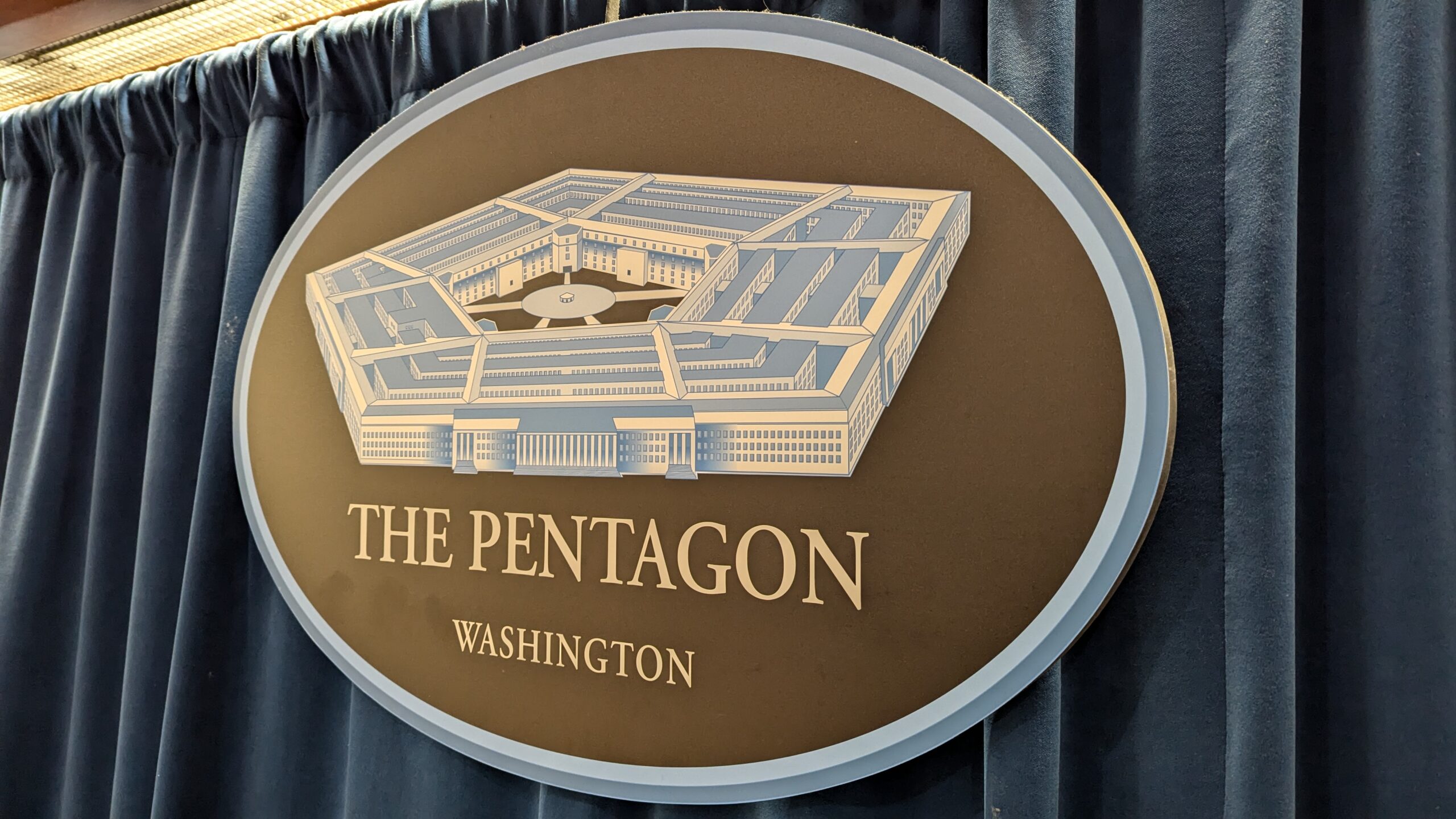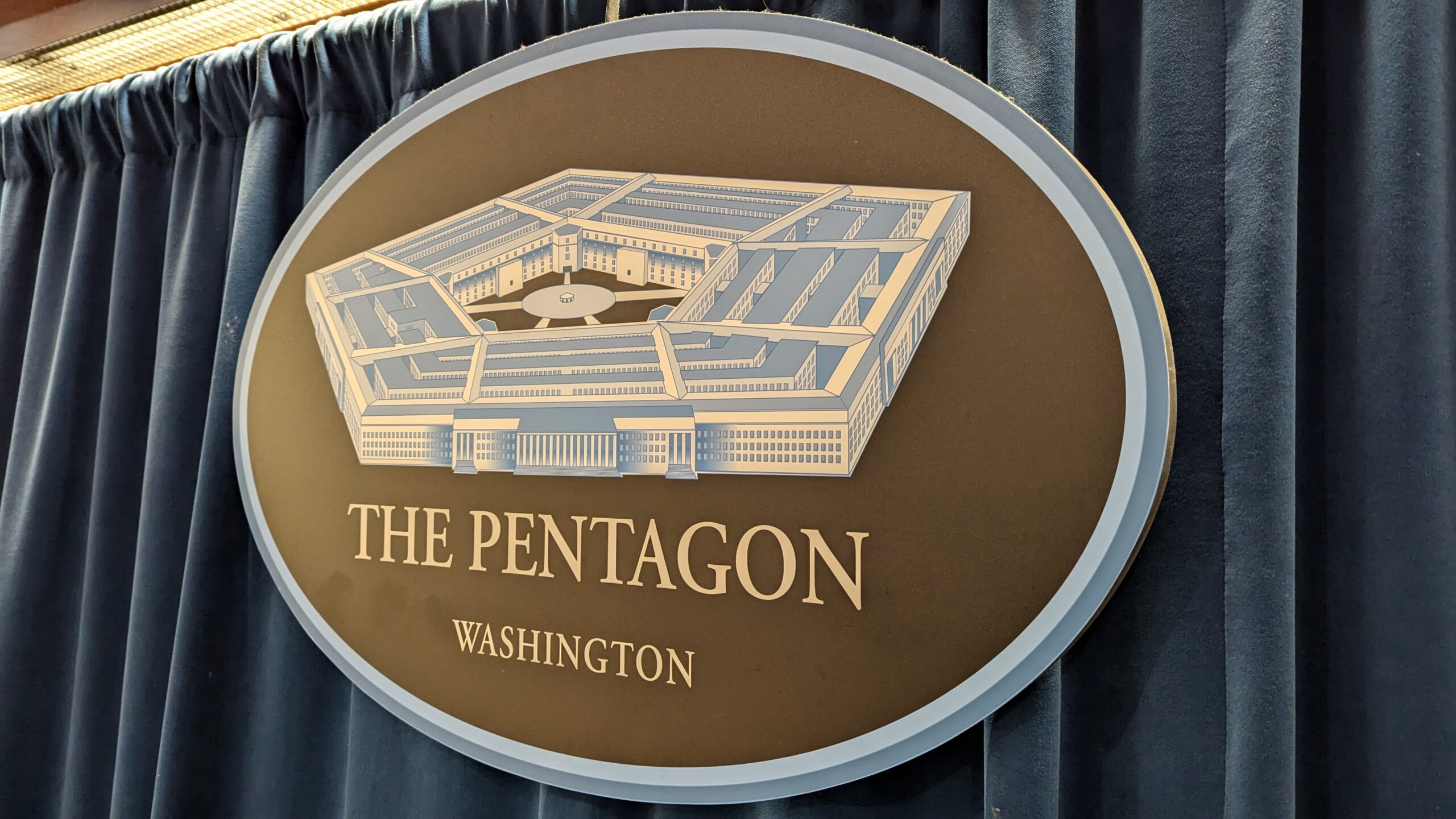
Seal of the Pentagon on display at the Pentagon visitor center. (Photo by Trevor Raney
Digital Media Division)
In less than two months, President-elect Trump will take office facing significant national security threats to US interests — particularly from China. Unfortunately, he will also have to grapple with a Department of Defense (DoD) and defense industrial base struggling to overcome decades of neglect to meet our nation’s increasingly complex defense needs.
The administration has a chance to take action early on. Within one month of taking office, the incoming secretaries of defense and state should sit down with key industry leaders for the “First Breakfast” — a frank and overdue conversation between the government and industry on these threats, what the government needs from industry, and industry’s take on how the government can help it meet these needs.
While the term “First Breakfast” has been offered in this context before, what we propose is something more comprehensive — a path to the relationship reset between government and industry in order to confront our hardest national security challenges.
In the twilight of the Cold War, Secretary of Defense Les Aspin and his deputy, Bill Perry, invited the CEOs of the nation’s largest defense companies to the Pentagon for a meeting in the Secretary’s dining room, now known as the “Last Supper.” In that 1993 meeting, Perry presented the group with a tough message: Defense budgets would shrink and the industry would need to consolidate to survive. Industry took that warning to heart, with the number of prime defense contractors shrinking from 51 to 5 by 2003 as a result of rampant mergers and acquisitions.
For much of the three decades since the Last Supper, the US enjoyed a period of uncontested military overmatch against our adversaries, unencumbered by the threat of a legitimate near-peer competitor. However, we now find ourselves in an era of historic uncertainty and international security challenges — a period in which Mara Karlin, a former senior DoD official, recently posited as a turn toward “total war,” in which all elements of national power are leveraged against a broad array of targets to reshape the world order. After decades of industrial mismanagement by the government, we now find our national advantage eroded and in need of urgent reinvigoration.
We are faced with the need to have a similarly urgent, but very different conversation to reverse the failures of the past — it is time for the “First Breakfast’. But given the complexity and opportunity of the modern geopolitical and economic environments, this meal needs to look different.
It should bring together not only the few remaining primes but also innovative new entrants, insurgent mid-sized companies, and national security-attuned private equity. Recognizing the modern focus on transforming conflict through automation and cutting-edge, rapidly evolving software, the First Breakfast should include our nation’s leading software companies.
And given the inextricable synergy between diplomacy and defense in securing our national interests, the need to support partner and allied militaries, and the opportunity to leverage industrial capacity and capital abroad, the secretary of state should co-lead this discussion.
(A disclaimer: Our employer, Beacon Global Strategies, represents a broad spectrum of clients, including defense and non-defense companies ranging from small startups to industry leaders.)
The discussion should lead with a candid conversation about the myriad of strategic threats we face and the erosion of our industrial overmatch — in both technology and mass. The next administration should be transparent about the operational challenges our military faces and include industry as the essential ally required to overcome them. Foundational challenges such as workforce shortfalls, the reality of static defense spending, and the impact of increasingly expensive, but necessary, investments in modernization and personnel should be discussed frankly as realities that directly inform industrial investment.
A successful First Breakfast would produce a path toward restoring trust, improving government-industry cooperation, increasing opportunities for new defense industry entrants and fostering competition, and reducing friction between industry and decisionmakers based on a shared understanding of each other’s motivations and challenges. But crucially, this cannot kick off a two-year process towards the development of a new industrial strategy.
Instead, within four weeks of meeting, the group should produce a list of guiding principles, detailing what government needs industry to do better, what the government can do to enable industry to meet government demand, and what issues the two need to continue working on side-by-side. The group should plan follow-on gatherings to develop and concrete actions and deliverables and track progress against the guiding principles for mutual accountability.
Importantly, this must not be a partisan endeavor — congressional senior leaders must be allies in these efforts to invigorate defense industrial base innovation and production. For too long, Congress has abrogated their duties to pass timely and regular appropriations, instead relying on continuing resolutions that defer their constitutional responsibility to a later date all the while immobilizing the entire defense community, leading to additional costs to the taxpayer. Senior congressional leaders should understand the gravity of inaction and partisan brinksmanship, and resume their responsibility as partners, not parochialists.
Of course, our military and industry have discussed many of these issues on the margins for years, particularly as our national security focus shifted away from counterterrorism and towards near peers. And efforts at all sorts of reform, from acquisition to foreign military sales to overcoming the “valley of death” are vital. A clear, blunt and more strategic “First Breakfast” conversation can push these difficult policy reforms forward.
It’s clear that our nation’s defense-industrial trajectory just isn’t sustainable. The “First Breakfast” would be a significant step towards resetting the government’s relationship with industry and orient the full strength of American power and ingenuity toward the national security challenges of today and the future.
Josh Kirshner is a Managing Director at Beacon Global Strategies, a national security consulting firm based in Washington DC. Previously he served as special assistant for political-military affairs to the Under Secretary of State for Arms Control and International Security at the State Department, as well as a staffer on the House Permanent Select Committee on Intelligence and worked in the office of US Senator Hillary Rodham Clinton.
Jonathan Green is an Associate Vice President at Beacon Global Strategies and most recently served as defense policy advisor for US Senator Jeanne Shaheen and national security advisor to US Representative Jason Crow. He previously served on the Senate armed services and foreign relations committees and worked in the Department of Defense.











